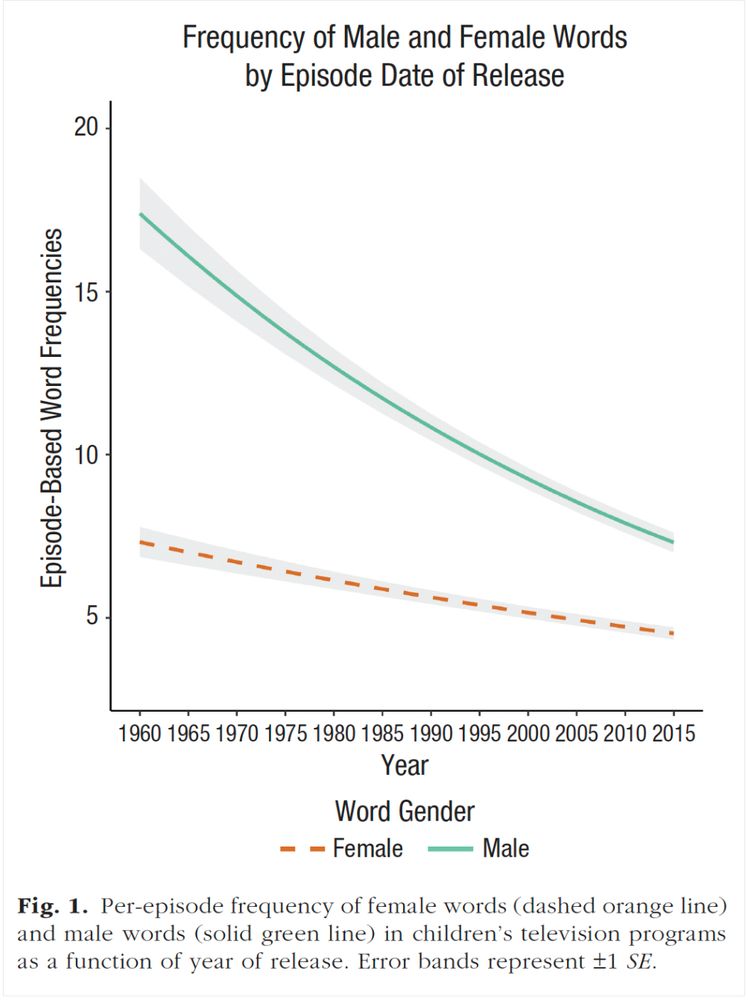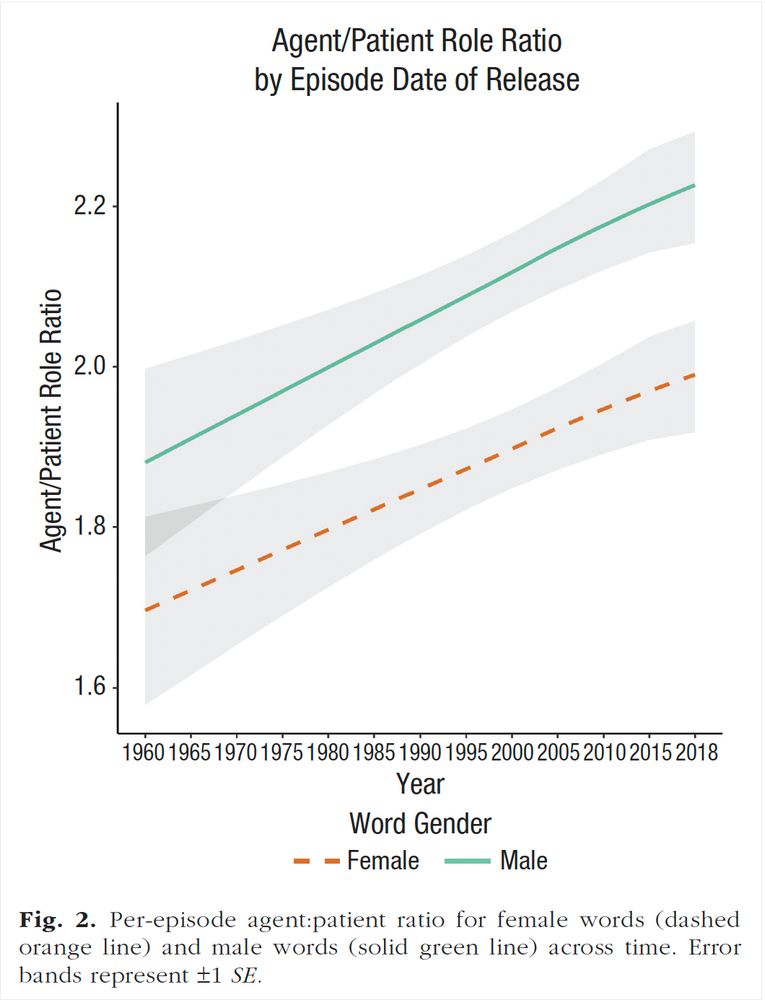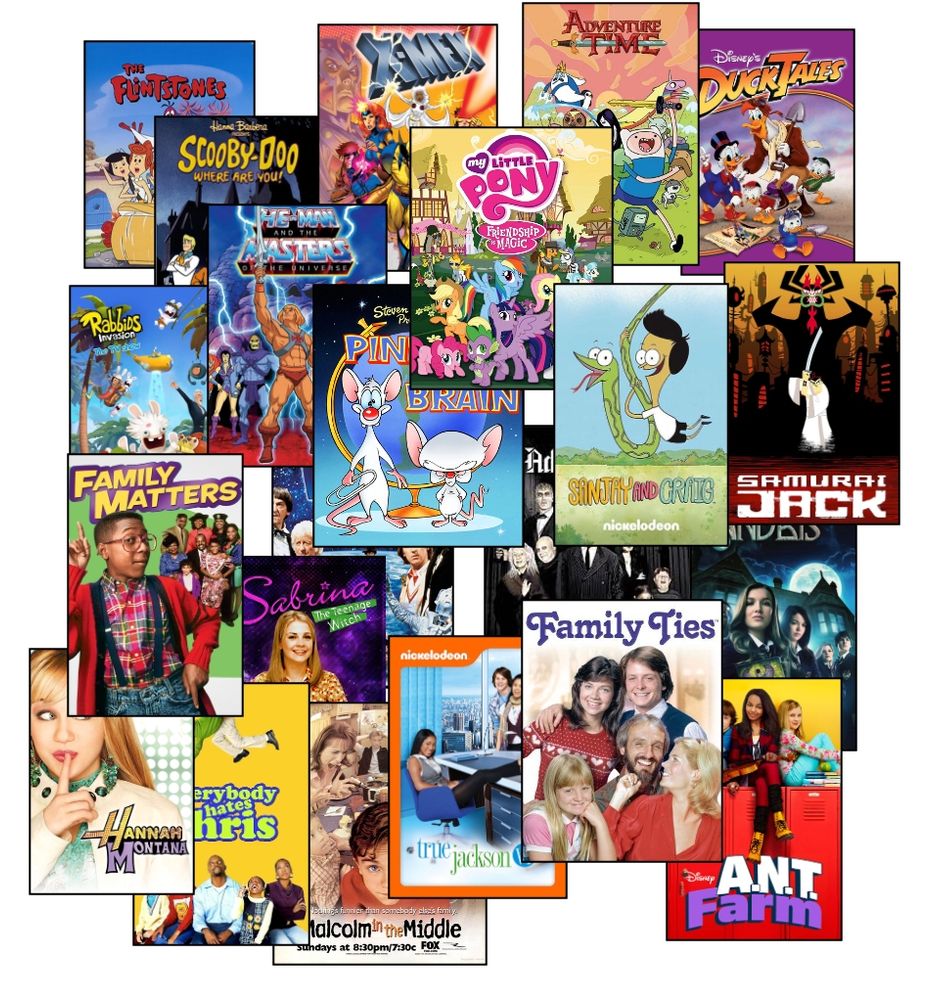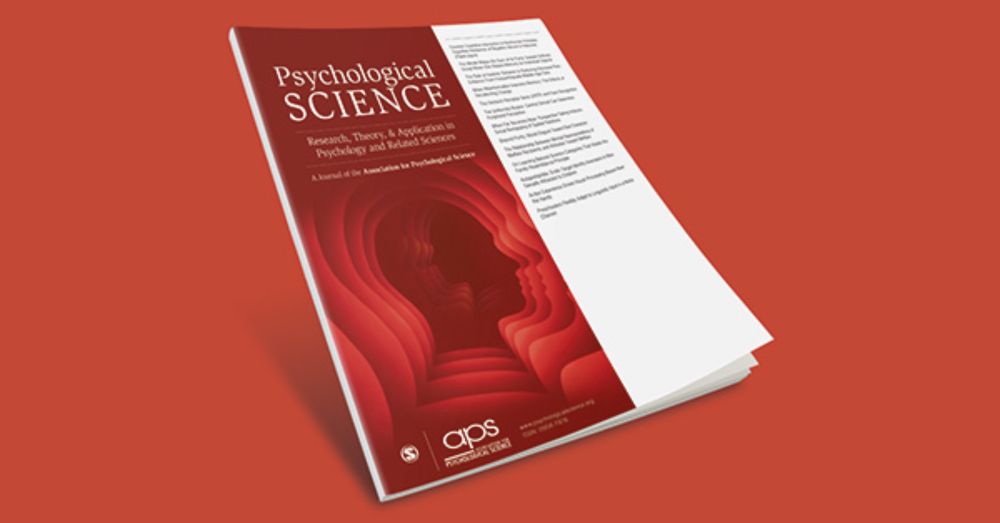Our new study in Psych Science @psychscience.bsky.social reveals many interesting-- and concerning -- things about the language on kids' shows, including a grammatical bias in favor of men and boys as agents or "doers" 👇
26.07.2025 15:18 — 👍 36 🔁 12 💬 2 📌 1
For creatives out there producing kid-directed content, esp. if relying on AI: Linguistic biases are subtle and you may not even notice that you’re embedding them in your stories… But you should pay attention because these linguistic cues teach kids what to expect about men and women 8/8
25.07.2025 09:35 — 👍 1 🔁 0 💬 0 📌 0
For our kindred spirits, the nerds 🤓: results hold using alternative NLP tools & a bunch of robustness tests, inc: testing for serial dependence, accounting for # of sentences and words, the nested structure of the data, show genre and target age, etc. See nitty-gritty in the paper! 7/8
25.07.2025 09:35 — 👍 0 🔁 0 💬 1 📌 0

For context, female words (e.g., characters) increased over 6 decades (great!) but numeric representation is only part of the story: seeing more fem. chars but in stereotypical ways may reinforce kids’ beliefs in unequal gender roles. Progress in gender rep. in media depends on where one looks 6/8
25.07.2025 09:35 — 👍 0 🔁 0 💬 1 📌 0
Also, male words co-occurred more w/ words about rewards, money, power, work, but female words appeared more oft. next to words re: family, affiliation, home. Some of these semantic biases have waned a bit since the ‘60s but the overall pattern is still evident in recent years 5/8
25.07.2025 09:35 — 👍 0 🔁 0 💬 1 📌 0

But our results are NOT fun: Words associated w/ boys/men appear more oft. as grammatical agents (“doers” in a sentence) vs. words associated w/ girls/women. Of 10 times that someone is described as a “doer”, 6.4 it's a male character (vs. only 3.6 female char). This bias hasn’t budged in 60ys! 4/8
25.07.2025 09:35 — 👍 1 🔁 0 💬 1 📌 0

What children see and hear in media shapes their worldviews. We covered kids’ TV shows from 1960 to ~2020. Many of us grew up with these shows, even outside the US (a bunch of my personal childhood favorites are in our dataset, which made this project pretty fun) 3/8
25.07.2025 09:35 — 👍 1 🔁 0 💬 2 📌 0
We used NLP tools to examine linguistic gender bias in a large dataset of scripts from 98 children’s TV shows in the US over the past 60 years (~3M sentences). We found gender biases both in syntactic structure and semantic content 2/8
25.07.2025 09:35 — 👍 0 🔁 0 💬 1 📌 0
Cool approach and interesting findings! I also found in new data a parenthood boost in worker status and hiring, which tends to go away in overly-masculine workplaces (esp for dads). We should talk!
30.05.2025 15:13 — 👍 0 🔁 0 💬 0 📌 0

Rapid Response Bridge Funding Program
In the face of recent abrupt shifts in federal funding for education research, including large-scale terminations of National Science Foundation (NSF) research grant awards, we have developed a rap...
FYI: The Spencer Foundation, Kapor Foundation, The William T. Grant Foundation, and the Alfred P. Sloan Foundation have collaborated to offer $25K rapid response grants.
"This rapid response bridge funding opportunity is for scholars and teams whose grants have recently been cancelled by NSF."
02.05.2025 21:16 — 👍 763 🔁 554 💬 6 📌 24
Happy to hear you liked this work!
22.02.2025 23:17 — 👍 1 🔁 0 💬 0 📌 0
Just one week left to apply for either the 2-year post-doc or 1-year Lab Manager roles at my new lab at NYU Abu Dhabi!
03.01.2025 14:45 — 👍 1 🔁 2 💬 0 📌 0
Congratulations 🎉🎉
19.10.2023 14:26 — 👍 0 🔁 0 💬 0 📌 0
The nation's oldest continuously published daily college newspaper. thecrimson.com
Professor of Psychology, Author of the Science of Racism, Rhodes Scholar, Oxford DPhil, ERC-funded, #BBCExpertVoices. He/him🇯🇲🇹🇹🇬🇧🇺🇸
Cognitive scientist, postdoc at iSearch lab (TU Munich), studying how children figure out other people. i have a kid & i like cooking & queer stuff. she/her
asst prof @Stanford linguistics | director of social interaction lab 🌱 | bluskies about computational cognitive science & language
Professor, Department of Psychology, New York University
Research: gender, stereotypes, motivation, explanation
President, @cogdevsoc.bsky.social
Married to @joecimpian.bsky.social
Website: https://cimpianlab.com
Professor of Psychology and Computer Science at USC
PhD student at University of Pennsylvania | multilingual NLP + cultural psychology | she/her 🌸
https://shreyahavaldar.com/
she/her | nsf graduate research fellow, dev psych phd student @ umich | examining the influence of media on children's gender identity development | williams college '24
[banner is from my fave piece of media of all time...]
Assistant Professor in Educational Psychology
University of Wisconsin-Madison
Studies motivation and equity in STEM, identity & stereotypes.
#queer #firstgen #feminist, She.
Dedicated to fostering basic & applied research on affect and emotion defined across a diversity of fields. See our website for #AffectScience2025 details!
society-for-affective-science.org
#PennState research institute that does #SocialScience.
Our mission is to foster research that addresses critical human and social problems at the local, national, and international levels.
Visit our website: https://ssri.psu.edu/
A nonprofit dedicated to advancing scientific psychology across disciplinary and geographic borders.
psychologicalscience.org
Jobs: jobs.psychologicalscience.org
Membership: psychologicalscience.org/members
#APSGlobal: APS Global Summit
Post-doc at NYU Abu Dhabi. A sociological/social-cultural psychologist who studies hierarchy, power, and a bit of methodology
Post Doctoral Research Fellow at UniMelb. Metascience, psychological measurement validity, social cognition, philosophy of science
Aarhus University-based research center dedicated to understanding the influence of artificial intelligence on text culture. Learn more here: https://arts.au.dk/en/text.
Political scientist & part-time farmer. Books: 'On Revolutions' (2022), 'Civil Resistance' (2021), & 'The Politics of Terror' (2019). Coming soon: 'Bread & Roses' & 'The End of People Power.' https://www.ericachenoweth.com. What a time to be alive.
Saudi Social psychologist




